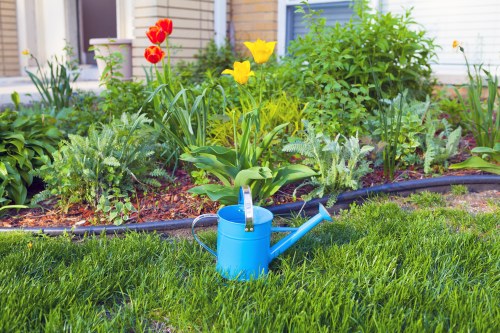Hedge Trimming in Sudbury: Enhancing Your Outdoor Spaces
Introduction to Hedge Trimming

Maintaining a well-kept garden is essential for both the aesthetic and health of your outdoor space. One of the key aspects of garden maintenance is hedge trimming. In Sudbury, where the climate can be harsh, regular hedge trimming ensures that your plants remain healthy and visually appealing throughout the year.
Hedge trimming serves multiple purposes, including shaping plants, promoting healthy growth, and preventing disease. Whether you have a small backyard garden or a large property, professional hedge trimming can make a significant difference in the overall appearance of your landscape.
In this article, we will explore the importance of hedge trimming in Sudbury, the benefits it offers, and how to choose the right service provider for your needs.
The Importance of Hedge Trimming in Sudbury

Climate Considerations
Sudbury experiences a wide range of temperatures and weather conditions, which can affect the growth and health of hedges. Proper trimming helps to mitigate the effects of cold winters and hot summers by promoting strong and resilient plant structures.
Health of Your Hedges
Regular trimming removes dead or diseased branches, reducing the risk of pests and infections spreading through your hedges. Healthy hedges are less susceptible to damage and require less maintenance over time.
Enhancing Curb Appeal
Well-trimmed hedges significantly enhance the curb appeal of your home or business. They create a neat and orderly appearance, making your property more attractive to visitors and potential buyers.
Benefits of Professional Hedge Trimming

Precision and Expertise
Professional hedge trimmers have the skills and knowledge to shape your hedges precisely. They understand the specific needs of different plant species and can tailor their trimming techniques accordingly.
Time and Efficiency
Attempting to trim hedges on your own can be time-consuming and physically demanding. Hiring professionals allows you to save time and ensures that the job is done efficiently and effectively.
Proper Tools and Equipment
Professional services come equipped with the right tools for the job, including specialized trimmers, shears, and other equipment that may not be available to the average homeowner.
Choosing the Right Hedge Trimming Service in Sudbury

Experience and Reputation
When selecting a hedge trimming service, consider their experience and reputation in the Sudbury area. Look for reviews and testimonials from previous clients to gauge the quality of their work.
Services Offered
Different companies may offer a range of services beyond hedge trimming, such as tree pruning, landscape design, and garden maintenance. Choose a service that can meet all your landscaping needs.
Pricing and Value
Compare pricing structures among various providers to ensure you are getting good value for your investment. While cost is a factor, it should not be the only consideration.
Seasonal Hedge Trimming Tips

Spring Trimming
Spring is an ideal time for hedge trimming as it promotes new growth. Focus on removing any damage from the winter and shaping the hedges for the upcoming growing season.
Summer Maintenance
During the summer, regular maintenance helps to manage the growth rate and maintain the desired shape. Ensure that hedges receive adequate water and nutrients to thrive.
Autumn Pruning
Autumn trimming prepares hedges for the colder months. Removing excess growth helps to prevent breakage under the weight of snow and ice.
DIY vs. Professional Hedge Trimming
Advantages of DIY
- Cost savings
- Personal satisfaction
- Flexibility in scheduling
Disadvantages of DIY
- Risk of improper trimming
- Time-consuming
- Potential for equipment damage or injury
While DIY hedge trimming can be appealing for those looking to save money, the benefits of hiring a professional service in Sudbury often outweigh the costs, especially in terms of the quality and longevity of your hedges.
Common Hedge Trimming Techniques

Shearing
Shearing involves using specialized clippers to create a uniform shape. This technique is ideal for formal hedges and maintaining straight, clean lines.
Pruning
Pruning focuses on removing specific branches to promote healthy growth. It is often used for shaping hedges and removing dead or diseased parts.
Scaling
Scaling is a more intensive trimming method that reduces the overall size of the hedge. It is useful for hedges that have grown too large or unruly.
Tools and Equipment for Hedge Trimming

Manual Shears
Manual shears are suitable for small hedges and precise trimming tasks. They allow for greater control but can be labor-intensive.
Electric Trimmers
Electric trimmers provide more power and are ideal for medium-sized hedges. They offer a good balance between efficiency and control.
Gas-Powered Trimmers
For large or dense hedges, gas-powered trimmers are the most effective. They offer maximum power and are suited for extensive trimming jobs.
Environmental Considerations
Sustainable Practices
Opting for environmentally friendly trimming practices can benefit both your garden and the broader environment. This includes recycling green waste and using eco-friendly products.
Impact on Local Ecosystem
Healthy hedges support local wildlife by providing habitat and food sources. Proper trimming ensures that hedges continue to play their role in the ecosystem without becoming overgrown or unmanaged.
Water Conservation
Efficient trimming techniques can reduce water usage by promoting better air circulation and reducing the likelihood of plant diseases that may require additional watering.
Cost of Hedge Trimming in Sudbury

Factors Affecting Pricing
- Size and height of hedges
- Type of plants
- Frequency of trimming
- Accessibility of the location
Average Pricing
The cost of hedge trimming in Sudbury can vary based on the factors mentioned above. On average, homeowners can expect to pay between $50 to $150 per hour for professional services.
Value for Money
Investing in professional hedge trimming ensures that the job is done correctly, potentially saving you money in the long run by reducing the need for repairs or replacements due to improper trimming.
Seasonal Challenges in Hedge Trimming

Winter Challenges
Winter poses challenges such as frozen branches and snow accumulation. Proper techniques and timing are essential to prevent damage and ensure healthy growth in the spring.
Summer Heat
Excessive heat can stress plants, making them more susceptible to pests and diseases. Trimming during cooler parts of the day can help minimize heat stress.
Spring Growth Spurts
Spring is a time of rapid growth, and timely trimming helps to manage this growth and maintain the desired shape and size of your hedges.
Maintaining Trimmed Hedges
Regular Inspections
After trimming, regularly inspect your hedges for signs of disease, pests, or uneven growth. Early detection can prevent larger issues down the line.
Proper Watering and Fertilization
Maintaining the health of your hedges involves proper watering and fertilization. Ensure your plants receive the necessary nutrients to support ongoing growth.
Mulching
Applying mulch around your hedges helps retain moisture, regulate soil temperature, and reduce weed growth, contributing to a healthier garden overall.
DIY Hedge Trimming Tips
Safety First
Always prioritize safety when trimming hedges. Use protective gear, such as gloves and safety glasses, and ensure that your tools are in good working condition.
Proper Technique
Use the right trimming techniques to avoid damaging your hedges. Make clean, precise cuts and avoid removing more than one-third of the plant's growth at a time.
Maintaining Tools
Regularly maintain your trimming tools by cleaning and sharpening them. Well-maintained tools make the trimming process more efficient and result in cleaner cuts.
Choosing the Right Plants for Your Hedges

Evergreen vs. Deciduous
Selecting the right type of hedge plant is crucial for achieving the desired look and functionality. Evergreen plants provide year-round greenery, while deciduous plants offer seasonal interest with their changing foliage.
Low-Maintenance Options
For those seeking easy upkeep, consider low-maintenance hedge varieties that require minimal trimming and are resilient to Sudbury's climate conditions.
Flowering Hedges
If you desire a more vibrant garden, opt for flowering hedges that add color and attract pollinators. Proper trimming will help these plants bloom more abundantly.
Eco-Friendly Hedge Trimming Solutions

Using Sustainable Tools
Choose eco-friendly tools and practices to minimize your environmental footprint. Electric or manual tools produce less pollution compared to gas-powered alternatives.
Composting Trimmings
Composting hedge trimmings is an excellent way to recycle green waste and create nutrient-rich compost for your garden, promoting sustainable gardening practices.
Integrated Pest Management
Implement integrated pest management techniques to control pests naturally, reducing the need for chemical pesticides and supporting a healthy garden ecosystem.
The Role of Hedge Trimming in Landscape Design

Creating Structure
Hedges can provide structure and definition to your garden, acting as natural boundaries or focal points within your landscape design.
Enhancing Privacy
Well-maintained hedges offer privacy by creating natural barriers that block unwanted views and reduce noise pollution from surrounding areas.
Complementing Other Plants
Strategically trimmed hedges complement other plants in your garden, enhancing overall biodiversity and creating a harmonious outdoor environment.
Common Mistakes to Avoid in Hedge Trimming

Over-Trimming
Removing too much of the hedge can stress the plant and lead to weakened growth. Aim to trim no more than one-third of the plant's height at a time.
Incorrect Timing
Trimming hedges at the wrong time of year can hinder growth or make them more susceptible to disease. Understand the optimal trimming seasons for your specific plants.
Using the Wrong Tools
Using inappropriate tools can cause damage to your hedges and pose safety risks. Ensure you are using the correct equipment for the size and type of hedge you are trimming.
Frequently Asked Questions about Hedge Trimming in Sudbury
How often should I trim my hedges?
The frequency of hedge trimming depends on the type of plants and their growth rate. Generally, hedges should be trimmed 2-3 times per year.
What is the best time of year to trim hedges in Sudbury?
Spring and autumn are ideal for hedge trimming in Sudbury, as these seasons promote healthy growth and prepare plants for the changing weather conditions.
Can I trim my hedges myself, or should I hire a professional?
While DIY trimming is possible, hiring a professional ensures precision, saves time, and reduces the risk of damaging your hedges.
Conclusion
Invest in Professional Hedge Trimming
Choosing professional hedge trimming in Sudbury can transform your garden, ensuring your hedges are healthy, well-shaped, and aesthetically pleasing. With the right care and maintenance, your hedges will enhance your outdoor spaces for years to come.
Enhance Your Garden Today
Don’t wait to improve the beauty and health of your garden. Contact us today to schedule your hedge trimming service and experience the difference professional care can make.
